Years ago, while living in Miami Beach, Florida myself, along with two other Jewish men (one of them my brother), shared the Gospel with some ultra-Orthodox rabbis. As I eavesdropped on the conversation my brother struck up with one of the rabbis, the words I heard astonished me.
My brother told the rabbi that recently the rabbi had been studying the Seventy Weeks of Daniel Chapter 9 and concluded that according to the prophecy, Messiah had to come before the temple was destroyed. The rabbi immediately turned pale and tried to deny it, but his speech betrayed him. It was a word of knowledge, and the rabbi was busted.
That rabbi is not the only one convinced by reading Daniel’s prophecy that Jesus of Nazareth is the Messiah. In the late 1800’s, an Eastern European rabbi while studying this prophecy was convinced and became a believer and was baptized. He started a ministry committed to reaching Jews called the American Board of Missions to the Jews. The name was changed to its present name Chosen People Ministry. Eternity alone will reveal how many Jews came to faith in Jesus because of this powerful prophecy.
Why is this prophecy so powerful in convincing Jews (and for that matter anyone) that Jesus is the Messiah? Because God gave Daniel the exact number of years from a particular starting point until Messiah would come. In other words, this prophecy links Old Testament history to the New Testament, providing the actual number of years until his coming. Let me explain.
First, we must determine what the English word weeks means in Daniel 9:24. In English, we would naturally assume that the term weeks is a reference to a seven-day period. But the Hebrew word for weeks means ‘unit of seven’, not literal weeks. The context must determine what is meant. Take, for example the story of Jacob and Leah and Rachel in Genesis 29. Jacob worked 7 years for Rachel and in the morning when he arose, he saw that he had actually slept with Leah, Rachel’s sister. Laban’s defense for such deceit— “It is not so done in our country, to give the younger before the firstborn. Complete the week of this one, and we will give you the other also in return for serving me another seven years” (Genesis 29:26-27). So Jacob pledged to serve Laban another seven years. In that story, a week is a period of seven years.
So, the context must determine whether the term weeks is referring to a literal seven-day period or else a seven-year period (as in the case of Jacob and Rachel). Most scholars of almost every eschatological persuasion believe, Daniel’s reference is to seven-year periods when he speaks of weeks. One indication of that is that during these seventy weeks the city and sanctuary would be rebuilt. If this was literally 490 days, that would mean that the temple and city would be rebuilt in a little over a year, an impossibility. So, the prophecy is clearly dealing with a period of 490 years rather than days. What would happen during this 490-year period? Daniel is told these six things:
“to finish the transgression, to put an end to sin,
and to atone for iniquity, to bring in everlasting
righteousness, to seal both vision and prophet,
and to anoint a most holy place.”
Daniel 9:24
Whoever fulfilled this prophecy had to accomplish these six things (9:24). Also, we should take special note of what this prophecy concerned— “about your people and your holy city.” To be exact, God gave Daniel the number of years in which God would fulfill his plans with the Jewish people and the city of Jerusalem. That is what the prophecy is about and its focus. If we lose track of that, we may wander off into speculations regarding things not dealt with in this prophecy.
In the next blog, I will focus on the typical way this prophecy is unusually divided into three sections.





0 Comments